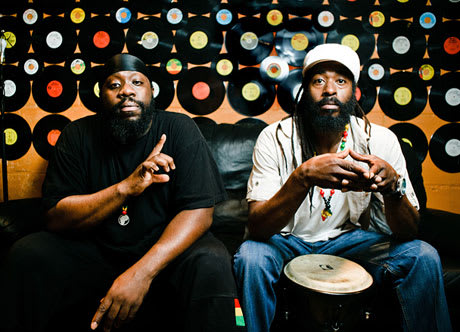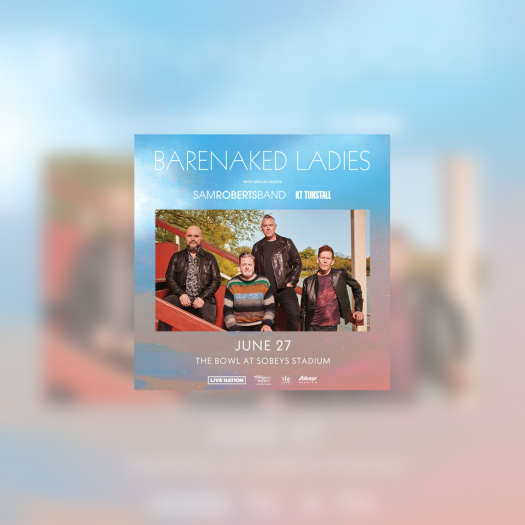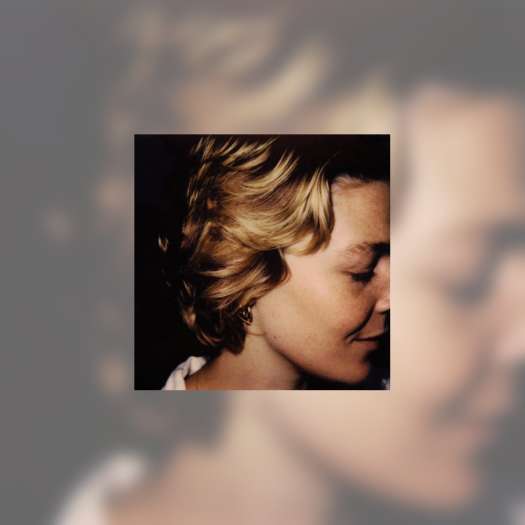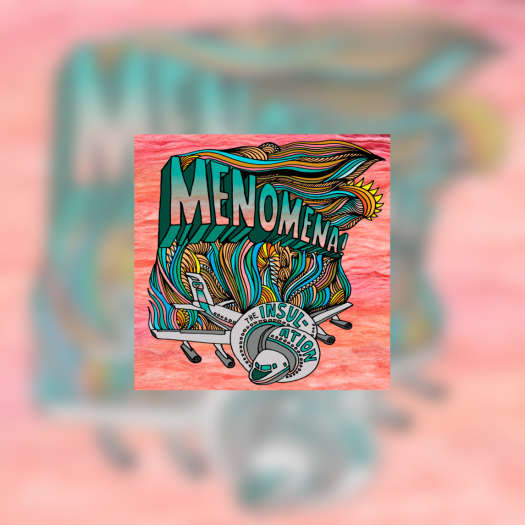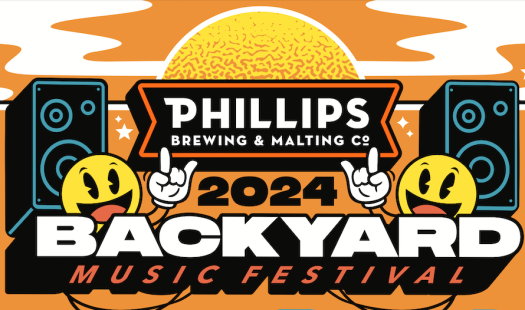Recording studios don't have to be sanctuaries of sterile gear, playrooms full of vintage toys or the desk of a bedroom workspace. Toronto's Trea Jah Isle is a throwback to the days of reggae and R&B where records for sale occupied the storefront with a studio in the back, a state of affairs that made the relationship between artist and public more immediate.
Situated in the heart of the Caribbean business strip in the Eglinton West neighbourhood of Toronto, Trea Jah Isle has been a destination for serious music heads for almost 20 years. Upstairs is a loud shop sporting dozens of posters of reggae artists past and present, carvings, clothing, health tonics and books. Co-owner Natty B holds a baby in his arms as fellow owner Jah Chozen works with customers. The two have run the store for 14 years, having bought it from its founder, reggae/gospel performer Nana Mclean.
"When we took over the store in '97, vinyl was the main form of the music," says Natty B. "But we saw the requests for that decline over the years. To upkeep the place, we had to think of other ways to keep the money coming in. That's where the studio came in." It's no small irony that the basement's dead stock of vinyl was cleared out to set up the studio. Now, however, "you have the record store upstairs, and come downstairs where the music is actually being made," he says of the retail/studio setup, which is similar to the shop's namesake: the legendary Treasure Isle in Jamaica.
The studio is about a year old, but has already attracted big stars on tour like Beres Hammond. It exists to play its role in the economy of reggae. It's not a place to record albums. Rather, these facilities exist primarily for one-off tracks, often to be used as exclusive dub plates ― single-pressing acetate records. These personalized tools give DJs greater standing among audiences. Most of the time artists are paid, which represents a second stream of income beyond their live appearances, however sometimes an artist will do it for free out of friendship, respect or self-promotion.
"Here on the block there was a major studio," Natty explains. "Up to recently we had one at Dufferin and Eglinton called Sniper Sounds. I'm a radio DJ and when artists would come, I would go there and meet major artists like Sugar Minott and Alton Ellis and get dubplates cut there. They closed so we saw a need for that."
The studio isn't awe-inspiring from a technical standpoint. The basement features a main room with properly separated isolation booths for vocals and drums. The control room next door doubles as a photo studio. There is much rack mounted effects processing, a Mac for recording and an AKAI sample workstation but other than that there are no mics around today, nor any music gear. Still, a definite addition to the studio's pedigree is veteran Toronto reggae engineer Roger B, who last month took up residence offering recording and mastering services.
What the studio has in abundance is atmosphere and a sense of history. "One of the first things we did when we set up the studio was get a wall of fame going paying tribute to the labels. Especially a mature DJ when he comes here can really appreciate that. Most of the studios you go to it's all modern."
"Capleton was up in here, he loved the vibes," Natty says enthusiastically. "There's a spiritual vibe to this place, that's what we keep on hearing. He said if he'd heard about this place he'd never have gone anywhere else. Gramps Morgan came up here, recently Bob Marley's granddaughter Donisha Prendergast was here and she was here doing a documentary. She fell in love and started writing. Next thing you know she was in the vocal booth voicing a track."
Natty wistfully remarks "a few years ago we couldn't do this interview on a Friday" because he and Chozen would be so busy serving customers jam-packed into the store. Those days are long gone; this is the new reality. At a time when home recording, social networking and free downloads threaten retail music establishments, Natty and Chozen are betting on Trea Jah Isle's considerable historic capital to help forward Toronto reggae into the future.
Situated in the heart of the Caribbean business strip in the Eglinton West neighbourhood of Toronto, Trea Jah Isle has been a destination for serious music heads for almost 20 years. Upstairs is a loud shop sporting dozens of posters of reggae artists past and present, carvings, clothing, health tonics and books. Co-owner Natty B holds a baby in his arms as fellow owner Jah Chozen works with customers. The two have run the store for 14 years, having bought it from its founder, reggae/gospel performer Nana Mclean.
"When we took over the store in '97, vinyl was the main form of the music," says Natty B. "But we saw the requests for that decline over the years. To upkeep the place, we had to think of other ways to keep the money coming in. That's where the studio came in." It's no small irony that the basement's dead stock of vinyl was cleared out to set up the studio. Now, however, "you have the record store upstairs, and come downstairs where the music is actually being made," he says of the retail/studio setup, which is similar to the shop's namesake: the legendary Treasure Isle in Jamaica.
The studio is about a year old, but has already attracted big stars on tour like Beres Hammond. It exists to play its role in the economy of reggae. It's not a place to record albums. Rather, these facilities exist primarily for one-off tracks, often to be used as exclusive dub plates ― single-pressing acetate records. These personalized tools give DJs greater standing among audiences. Most of the time artists are paid, which represents a second stream of income beyond their live appearances, however sometimes an artist will do it for free out of friendship, respect or self-promotion.
"Here on the block there was a major studio," Natty explains. "Up to recently we had one at Dufferin and Eglinton called Sniper Sounds. I'm a radio DJ and when artists would come, I would go there and meet major artists like Sugar Minott and Alton Ellis and get dubplates cut there. They closed so we saw a need for that."
The studio isn't awe-inspiring from a technical standpoint. The basement features a main room with properly separated isolation booths for vocals and drums. The control room next door doubles as a photo studio. There is much rack mounted effects processing, a Mac for recording and an AKAI sample workstation but other than that there are no mics around today, nor any music gear. Still, a definite addition to the studio's pedigree is veteran Toronto reggae engineer Roger B, who last month took up residence offering recording and mastering services.
What the studio has in abundance is atmosphere and a sense of history. "One of the first things we did when we set up the studio was get a wall of fame going paying tribute to the labels. Especially a mature DJ when he comes here can really appreciate that. Most of the studios you go to it's all modern."
"Capleton was up in here, he loved the vibes," Natty says enthusiastically. "There's a spiritual vibe to this place, that's what we keep on hearing. He said if he'd heard about this place he'd never have gone anywhere else. Gramps Morgan came up here, recently Bob Marley's granddaughter Donisha Prendergast was here and she was here doing a documentary. She fell in love and started writing. Next thing you know she was in the vocal booth voicing a track."
Natty wistfully remarks "a few years ago we couldn't do this interview on a Friday" because he and Chozen would be so busy serving customers jam-packed into the store. Those days are long gone; this is the new reality. At a time when home recording, social networking and free downloads threaten retail music establishments, Natty and Chozen are betting on Trea Jah Isle's considerable historic capital to help forward Toronto reggae into the future.
